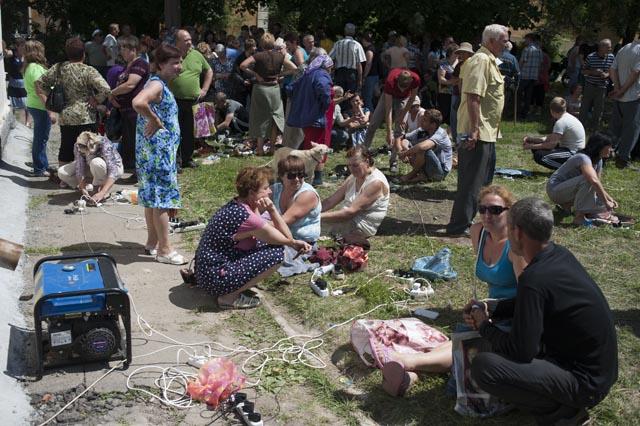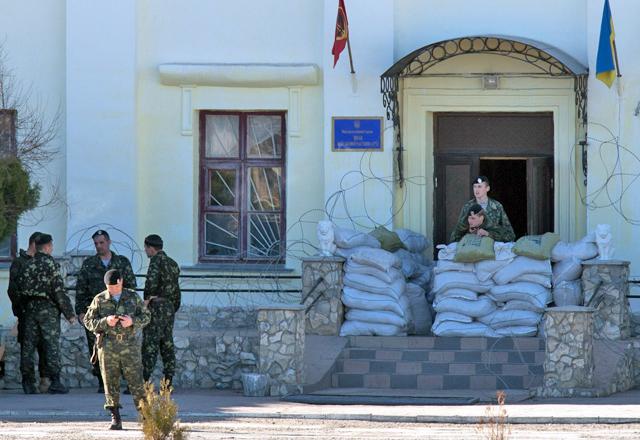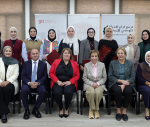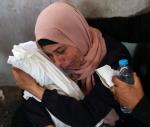You are here
Pro-Kremlin gunmen gain ground in crisis-hit Ukraine
By AFP - Apr 14,2014 - Last updated at Apr 14,2014
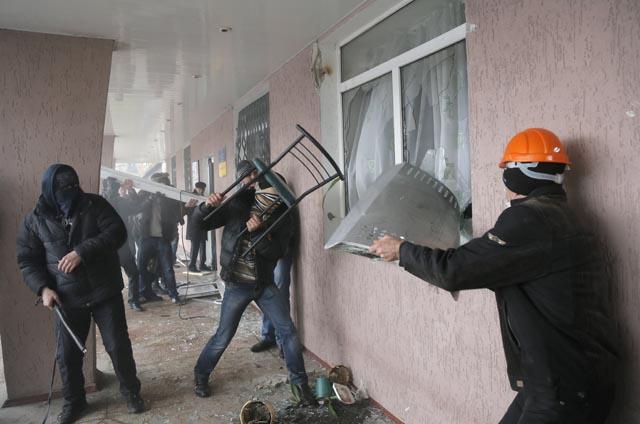
SLAVYANSK, Ukraine — Pro-Russian insurgents gained more ground on Monday in Ukraine’s separatist east while Kiev’s Western-backed leader sought a way out of the crisis by proposing a referendum and seeking UN help.
The Kremlin added an ominous tone to the rapid escalation by saying that President Vladimir Putin had received “a lot” of requests from Ukraine’s Russified rust belt “to help, to intervene in some form”.
The crystallising possibility of an invasion by some 40,000 Russian troops massed along Ukraine’s eastern border drew European calls for further sanctions against Russia and the approval of more than $2 billion in US and EU aid for Kiev’s embattled interim administration.
But the pro-Kremlin militias who have seized state buildings in coordinated raids across economically depressed eastern Ukraine appeared only to be gaining confidence while paying little heed to the “full-scale anti-terrorist operation” announced with much fanfare in Kiev.
Protesters armed with rocks and clubs smashed their way inside a police station in Gorlivka — a coal mining town straddling a highway between the regional capital Donetsk and the city of Slavyansk to the north that is now under effective militants’ control.
The unrestrained crowd whistled and cheered as they ripped away metal shields from the visibly frightened local force before raising the tricolour flag of the self-declared “People’s Republic of Donetsk”.
And Kalashnikov-wielding militants in the 300,000 strong city of Slavyansk — who are already in control of the local police station and security service office — also took command of its administration building before asking Putin to send in his troops.
“We call on Russia to protect us and not to allow the genocide of the people of Donbass (Donetsk region),” rebel leader Vyacheslav Ponomaryov told a group of reporters.
“We ask President Putin to help us.”
National referendum
The spreading unrest is rooted in the deep mistrust in the big industrial cities that form a corridor along Ukraine’s Russian border of the new, nationalist government that enlisted Western support in toppling the Kremlin-backed authorities in February.
Pro-Kremlin protesters in rundown regions such as Donetsk and Kharkiv are now seeking local referendums on either broader rights or an option to join the Russian Federation.
Ukraine’s interim president on Monday made a dramatic about-face aimed at defusing the tensions by backing a national poll on turning the centralised nation into a loose federation in which regions enjoyed broader rights.
Washington has previously advised Kiev to devolve powers in order to remove any argument Putin might make about discrimination against Russian speakers — a charge that has fed fears that Moscow’s annexation of Crimea last month was only the start of long-term Kremlin plan to dismember Ukraine.
Interim President Oleksandr Turchynov furiously resisted the Russian-backed federalisation proposal. But he said on Monday that he was ready to put it up for a national vote to prove that most shared his view.
“We are not against holding a national referendum,” Turchynov told lawmakers. “I am certain that a majority of Ukrainians will support an indivisible, independent, democratic and united Ukraine.”
Turchynov’s announcement stops well short of meeting protesters’ calls for each Russian-speaking region to stage its own referendum and it remains unclear how the militias — or Moscow — intend to respond.
The outcome of a national vote is uncertain because polls show most in Kiev and the Ukrainian-speaking west supporting a strongly unified state.
Putin shows ‘great concern’
The Ukrainian leader’s office said Turchynov on Monday also asked UN Secretary General Ban Ki-moon for help “in conducting a joint anti-terrorist operation in the east” — a comment that hinted of hope in Kiev that the global body might send a peacekeeping mission into the flashpoint east.
There was no initial response to Kiev’s statement from the United Nations and Turchynov’s office failed to explain what precise help Ukraine was requesting from Ban.
The pro-Kremlin gunmen’s latest raids were especially unsettling for Kiev and Western leaders because of their remarkable similarity to events leading up to Russia’s annexation of Crimea.
The balaclava-clad gunmen were armed with special-issue assault rifles and scopes most often used by nation’s crack security troops. They also moved with military precision and cohesion.
Russia has vehemently denied increasingly insistent US and European charges of it being behind the unrest.
But the Kremlin on Monday did little to dispel concern in either Kiev or the West that it was planning to take a strategic hold of eastern Ukraine.
“Unfortunately, we are receiving a lot of... requests from the regions of east Ukraine, addressed personally to Putin, with a request to help, to intervene in some form,” Russian news agencies quoted Putin’s spokesman Dmitry Peskov as saying.
“The Russian president is watching the development of the situation in these regions with great concern.”
EU foreign ministers meeting in Luxembourg on Monday responded by announcing that was prepared to call a Ukraine crisis summit next week to toughen sanctions against Russia.
“It appears obvious that Russia bears some responsibility for this violence. We must act,” said French Foreign Minister Laurent Fabius.
“Should it be necessary, there can be a meeting next week of Europe’s heads of state and government to agree new sanctions.”
Related Articles
Ukraine’s new Western-backed President Petro Poroshenko got down on Sunday to the Herculean task of pacifying a deadly pro-Kremlin insurgency and averting a devastating Russian gas cut.
Ukraine’s interior minister said on Saturday that most pro-Russian rebels and their top commander had fled their main eastern stronghold in what would be Kiev’s biggest success of the nearly three-month campaign.
Ukraine’s Western-backed leaders voiced fears on Sunday of an imminent Russian invasion of the eastern industrial heartland following the fall of their last airbase in Crimea to defiant Kremlin troops.


